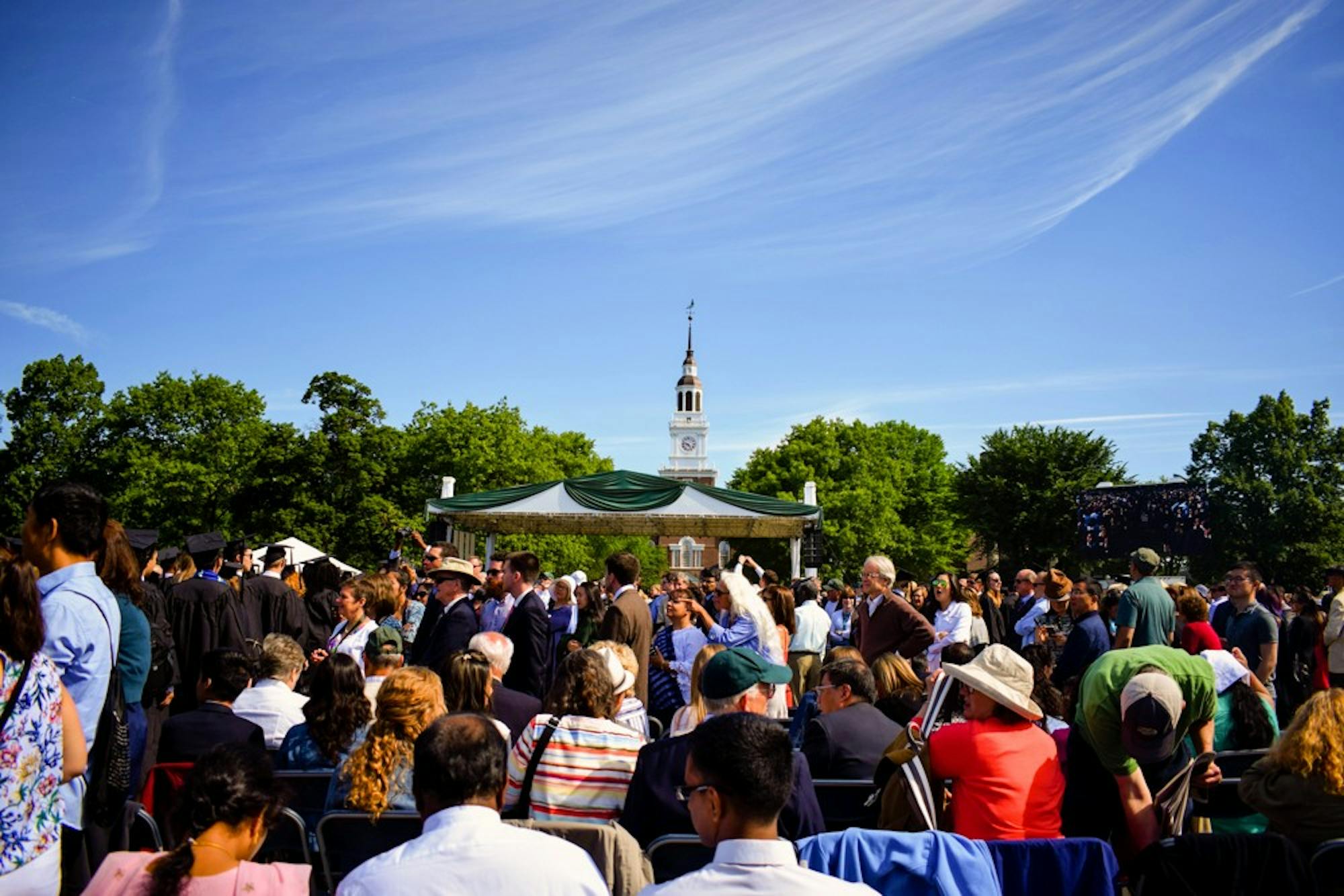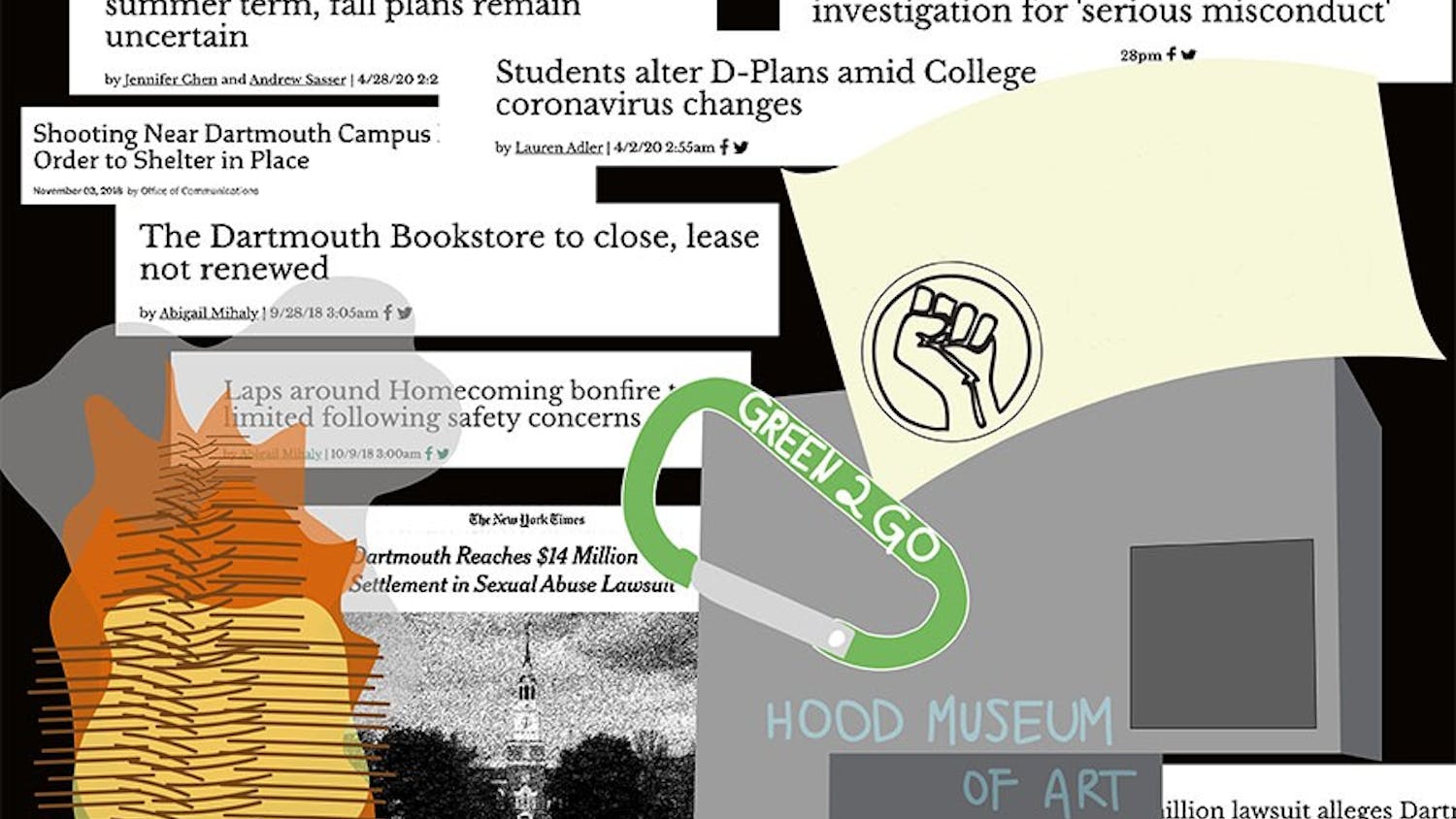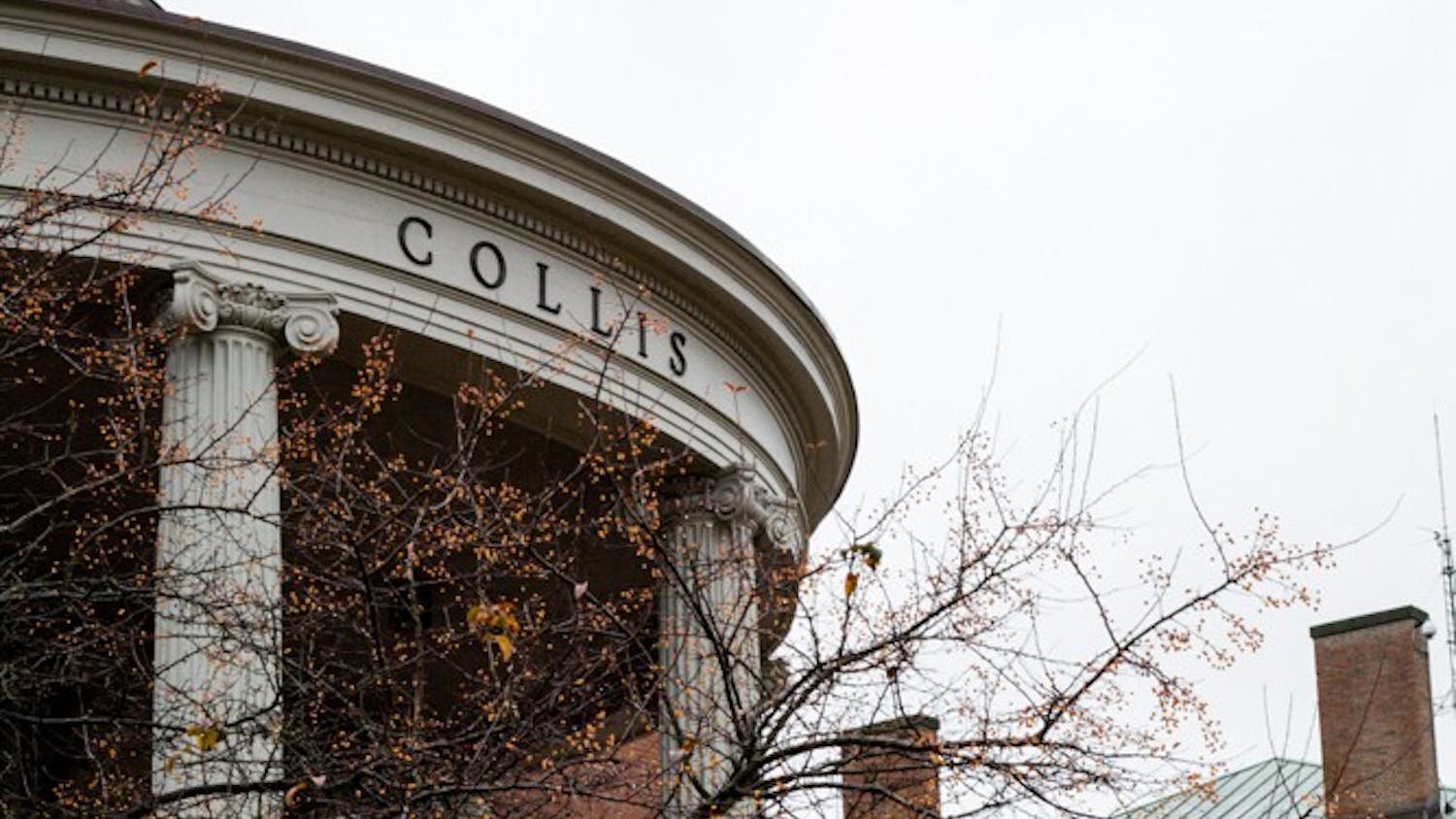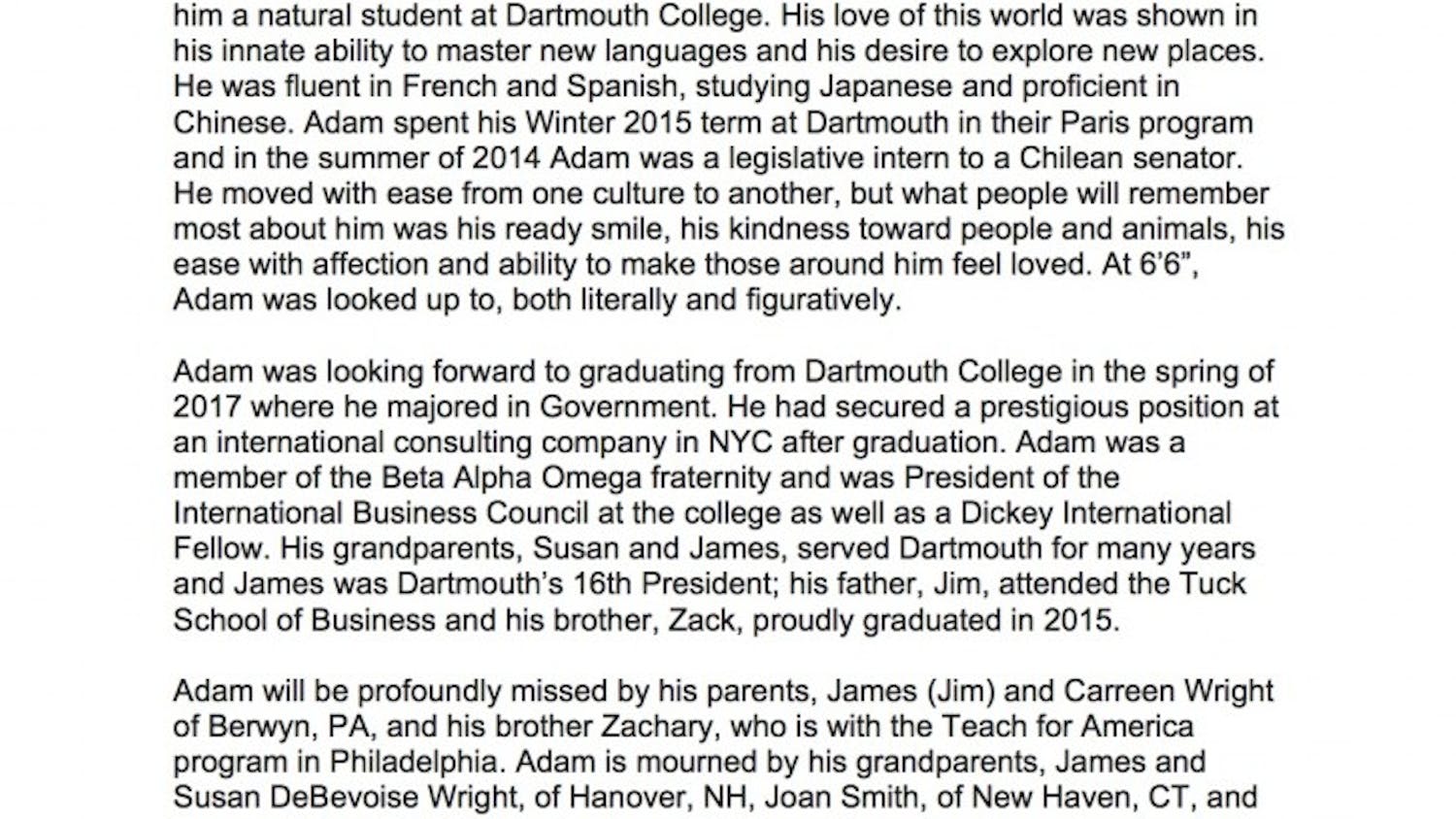This article is featured in the 2020 Commencement special issue.
Dartmouth’s first Commencement ceremony, held in 1771, bore very little resemblance to the modern graduation ceremony — and even less to the virtual ceremony that will be held for the Class of 2020 this June. However, the purpose of Commencement has held true over time.
In the 249 years since Dartmouth’s first Commencement, the College has seen numerous tumultuous events and historical moments. Commencement ceremonies, as a result, have taken a variety of shapes and forms.
From Humble Beginnings
College archivist and records manager at Rauner Special Collections Library Peter Carini said that the first Commencement ceremony, which was held in August 1771, was a far more “rustic” experience than what Dartmouth graduates have experienced in recent years. The event was likely held inside a building called College Hall that stood near what is now the southeast corner of the Green. Since trees were still being cleared outside and the ground was likely covered in stumps, the graduation probably had to take place indoors. In attendance were the four members of the graduating class, founder of the College Eleazar Wheelock and the faculty, who were called “tutors” at the time. However, there were a few notable people missing from the event, which led to a major setback.
“There were basically log buildings and very few roads,” Carini said. “And they couldn’t get a quorum of the trustees to show up to actually graduate the class.”
With the quorum of trustees unable to attend, the degrees could not be awarded to the four graduating students and were instead awarded later, according to Carini. The only member of the Board of Trustees who was able to attend the ceremony was British colonial governor of New Hampshire John Wentworth, along with his “retinue” — “a bunch of gentlemen who weren’t too pleased to be in the midst of muddy Hanover at the time,” according to Carini.
Each member of the graduating class was required to give a speech to demonstrate their “oratorical and academic knowledge,” Carini said. However, this process eventually became too arduous as graduating classes became bigger in size.
According to Carini, the Commencement ceremony has been held at many locations over the year to accommodate larger crowds, including the Bema, the Baker Green, Memorial Field and the College Green — but this will be the first year that the ceremony is held online. However, that isn’t to say that graduation hasn’t been disrupted before.
Wartime Puts Traditions on Hold
The Commencements of 1917 and 1918 felt the repercussions of U.S. involvement in World War I. As Eugene Francis Clark, a member of the Class of 1901, wrote in his book “War Record of Dartmouth College, 1917-1918,” the College decided that students leaving for military service or for work on farms to increase wartime agricultural production should be given academic credit during the spring of 1917. As the war continued into 1918, the number of students enrolled dwindled as more students withdrew to enter military service. The College’s academic year ended on May 24, about three weeks earlier than usual. The trustees voted that members of the Class of 1918 who went into the military service would be given their degrees.
“Many men from the various branches of the service returned for their degrees at Commencement time and, in the place of academic costume, wore the regular uniform of the service that they represented,” Clark wrote.
On May 26, 1918, Baccalaureate Sunday, there was an organ recital in Rollins Chapel and a memorial service in honor of the 19 Dartmouth men who were known to have died in the war up to that date.
Commencement took place on May 27. Then-College President Ernest Martin Hopkins gave diplomas to the parents of men away in service later that day.
Twenty-four years later, World War II presented one of the greatest challenges to Commencement. The graduation of the Class of 1942 was moved to May to allow students to join the war effort sooner, according to Carini. Dartmouth participated in the V-12 Navy College Training Program, where most students took a hybrid of Dartmouth courses and V-12 military courses, according to Carini. Carini added that the basement of Thornton Hall was used for submarine training.
From 1943 to 1945, as U.S. involvement in the war ramped up, there were no Commencement ceremonies.
A Historic Speech

Former U.S. President Dwight D. Eisenhower spoke at the 1953 Commencement ceremony during the Cold War.
History followed its course, World War II came to an end and Commencement ceremonies resumed. In 1953, the U.S. was already immersed in another conflict that would last for decades: the Cold War. During that year’s Commencement ceremony, then-U.S. President Dwight D. Eisenhower, an honorary doctorate recipient, gave an “‘informal’ address, delivered offhand without the aid of secretaries, Cabinet members and publicity experts,” according to The New York Times. The speech gained media attention across the nation.
Eisenhower spoke out against the censorship of communist literature in a time when anti-communist sentiments dominated the American political climate.
“Don’t join the book burners,” Eisenhower said to the graduating class, “Don’t be afraid to go in your library and read every book, as long as that does not offend our own ideas of decency. That should be the only censorship.” Eisenhower asked the class: “How will we defeat communism unless we know what it is? ... We have to fight it with something better. Not try to conceal the thinking of our own people.”
Eisenhower’s speech made headlines and was interpreted as an attack against former Sen. Joseph McCarthy (R-WI), the chairman of the U.S. Senate Permanent Committee on Investigations, who had accused some of the State Department’s members of being communists and dispatched aides to demand that “subversive” books be “purged” from the shelves of U.S. government libraries abroad. However, Eisenhower denied having targeted McCarthy.
In the July-August 2016 edition of the Dartmouth Alumni Magazine, Richard C. Cahn ’53 wrote about this monumental day and its impact on American history.
“I cannot remember that day without reliving the excitement we all experienced,” Cahn wrote. “As always, [former College President John Sloan] Dickey composed an elegant honorary degree citation, and I felt pride in my College as he read the words and awarded Eisenhower an honorary doctorate. The president was scheduled to make a few remarks in appreciation of the honor and to wish us well. Some of those words flew across the globe and instantly became a part of Dartmouth’s history — as well as America’s.”
Speakers Leave Lasting Impressions

Former U.S. President Bill Clinton delivered the 1995 Commencement address.
Four years after the end of the Cold War, former U.S. President Bill Clinton delivered the 1995 Commencement address. In his speech, he honored the sacrifice of the Class of 1945, who walked with the Class of 1995 at Commencement.
“I wanted to thank you, too, for honoring the Class of 1945. See them there? They did not have a proper Commencement because they left right away to finish the work of World War II,” Clinton said. “One of the greatest privileges of my presidency has been to express over the last year the profound gratitude of the American people for the generation that won World War II.”
Clinton and Eisenhower were not the only U.S. presidents to attend Commencement at Dartmouth. Joining them was former president George H.W. Bush, who received an honorary degree at Dartmouth’s 2011 Commencement along with eight others, including late-night talk show host and comedian Conan O’Brien.
However, Bush’s arrival on campus did not go according to plan. June 12, 2011, the day of Commencement, was cold and overcast. The day before the ceremony, Bush’s chief of staff emailed Peter Robinson ’79, Trustee emeritus, to announce that Bush had come down with a virus. Bush’s physician had advised against Bush’s visit to Hanover. The unpleasant weather made his arrival even less likely. Despite these obstacles, Bush made it to campus. In a Dartmouth News article remembering Bush after his death, Robinson recounted this moment.
“[I]f you want to grasp [Bush’s] character, this incident — this visit to Hanover on a frigid, blustery spring day seven-and-a-half years ago — represents a good place to start. Eighty-seven years old and confined to a wheelchair, he would still rather put himself out than let anyone down,” Robinson wrote.

Former U.S. President George H.W. Bush received an honorary degree in 2011.
Student speakers have made Commencement history as well. Michael Lowenthal ’90, who spoke at his 1990 Commencement, became the first openly gay valedictorian. He came out during his sophomore year and spent time organizing LGBTQ activism on campus. He helped launch the first gay and lesbian publication at Dartmouth, which was titled “In Your Face.”
When Lowenthal announced his sexuality in his Commencement speech, he said that it did not surprise anyone on campus. However, there were many people in the audience who did not know him prior to the ceremony. The Dartmouth Review opined that he “effectively ruin[ed] graduation.” However, Lowenthal remembers “lots of applause” and being “swamped with well-wishers.” The New York Times, in fact, reported that Lowenthal received a standing ovation.
Lowenthal conceptualized the speeches on graduation day as the equivalent of a religious sermon.
“We’re constantly talking about community and what the Dartmouth community meant,” Lowenthal said. “I think so many communities — be they religions, nation states or colleges — are sort of epitomized by their rituals, especially their transition rituals. For me, Commencement is a crucial time for taking stock of what really counts in the community and what defines the community.”
This year, the Dartmouth community has struggled to find a way to preserve the traditions and rituals of Commencement with the graduating class scattered across the globe. In lieu of a gathering on the Green, members of the Class of 2020 will tune from their homes to watch their degrees be conferred virtually. The address from this year’s Commencement speaker, Khan Academy founder Sal Khan, will be pre-recorded. Graduates of the Class of 2020 will be saluted through a video displaying their names and photos at the end of the ceremony.
Although Commencement has evolved, weathered disruptions and assumed different forms over the years, Carini noted that the symbolism of Commencement has stood the test of time.
“[Commencement] was like anointing someone as a knight or entering them into the priesthood,” Carini said. “It was welcoming you into the ranks of the educated. It was symbolic of that process. And it still is that today. It’s the separation of students from the College.”
While the COVID-19 pandemic has dramatically altered Commencement festivities for the Class of 2020, members of the Dartmouth community will still gather on June 14, albeit virtually, to celebrate the graduating class’s transition to the world beyond Dartmouth. That moment, unusual as it may be, will undoubtedly secure its spot among the historic Commencements that have come before.




